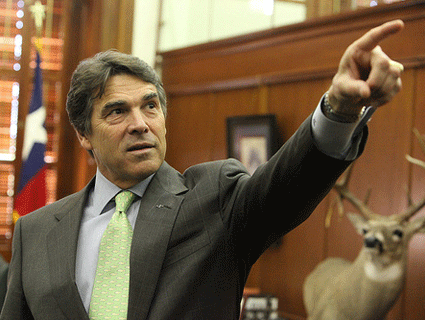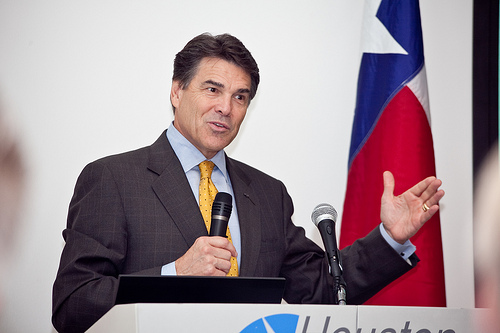
<a href="http://www.flickr.com/photos/scobleizer/3367455078/">Robert Scoble</a>/Flickr
Texas Governor Rick Perry always insists that he’s not running for president, but who believes him? Ever since his January inauguration speech, which sounded like a national political ad, the tea party’s favorite rainmaker has been hinting at larger ambitions. There were the broadsides of Barack Obama. The lighthearted talk-show appearances. The advisors who packed off to work for Newt Gingrich (leading to speculation of a Gingrich/Perry ticket). And, as revealed yesterday, there were Perry associates talking up Goodhair’s designs on the White House and poking around Iowa.
As strange as it may sound, Perry’s strengths and his party’s weaknesses might actually make him a serious primary contender. Four short years after George W. Bush seemingly poisoned the Texas political well, Perry has emerged as a tea party hero by practicing a form of small-government fundamentalism that makes Bush look like a moderate. Facing a $27 billion budget shortfall, Perry pushed to eviscerate funding for the state’s overburdened schools and social services instead of raising taxes or even tapping the state’s $9.4 billion Rainy Day Fund. He has redefined fiscal conservatism to mean not spending crisis money at a time of crisis.
Perry has worked hard to position himself favorably against Sarah Palin, who he surely views as a competitor. In 2009 he out-wingnutted her by suggesting that it might not be unreasonable for Texas to secede. It was one of many shrewd rightward pivots that Perry made just as the Lone Star State’s political winds began blowing against the Republican establishment. But Perry can spin his image in ways that the Grizzly Mama can’t: He can claim vastly more governing experience and bipartisan credibility, which might make him an easier sell to the GOP’s vestigial moderates. He’s the nation’s longest-serving governor, who began his political career as a Democrat. (That he agrees with Democrats on almost nothing these days scarcely matters in the world of campaign ads.)
Ultimately, Perry’s Texaness might be less a liability than a launchpad. Despite longstanding friction between Perry and Bush, the homegrown money machine that Karl Rove built would certainly kick into high gear to back a native son (as would the donors Perry has met as the chairman of the Republican Governors Association). Moreover, the Texas economy has fared comparatively well during the recession, in part due to a lack of housing speculation and the buffering effect of oil profits. While Perry probably doesn’t have much to do with that, he’d certainly base his campaign on it, arguing that all is explained by his state’s low taxes, small government, and business-friendly tort reforms.
Paul Burka, a political blogger for Texas Monthly, argued in 2009 that Perry has had the presidency in mind ever since he decided to stick around and fight US Senator Kay Bailey Hutchison in the gubernatorial primary:
That would explain a lot of things—for starters, why he decided to seek four more years as governor, after he had told many of his supporters he wouldn’t (implicitly clearing the way for them to support Hutchison in 2010); and why he didn’t choose to take a victory lap and make easy money on the boards of companies that benefited from his governorship. He has to remain on the political stage in order to compete for the presidential nomination. A beatdown of Kay Bailey Hutchison in the Republican primary would elevate his standing as the GOP’s leading conservative figure.
If that was the plan, then it has worked out pretty well so far. As soon as Gingrich implodes and Romney fizzles, Perry could be the man to watch.





